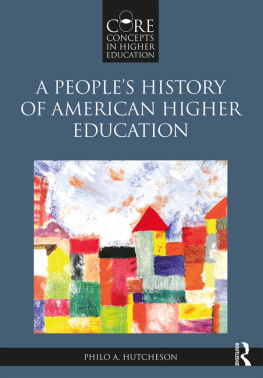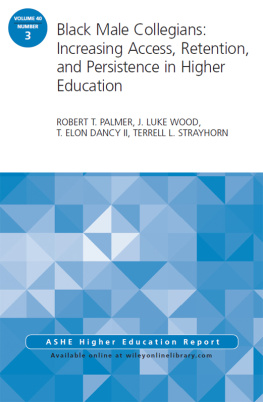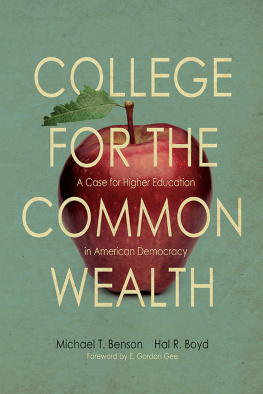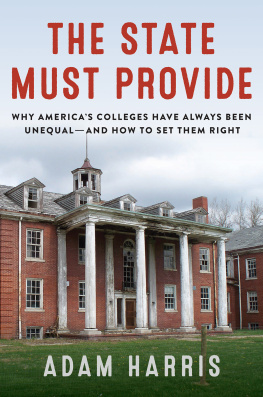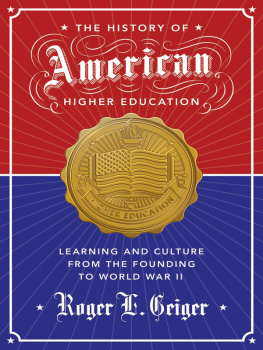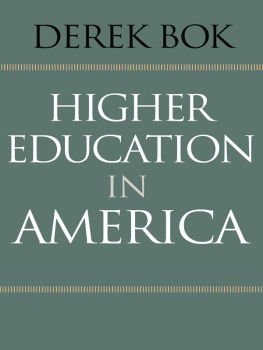
A Peoples History of American Higher Education
This essential history of American higher education brings a fresh perspective to the field, challenging the accepted ways of thinking historically about colleges and universities. Organized thematically, this book builds from the ground up, shedding light on the full, diverse range of institutionsincluding small liberal arts schools, junior and community colleges, black and white womens colleges, black colleges, and state collegesthat have been instrumental in creating the higher education system we know today. A Peoples History of American Higher Education focuses on those participants who may not have been members of elite groups, yet who helped push elite institutions and the country as a whole. This pathbreaking textbook addresses key issues that have often been condemned to exceptions and footnotesif not ignored completelyin historical considerations of U.S. higher education; particularly race, ethnicity, gender, and class.
Hutcheson introduces readers to both social and intellectual history, providing invaluable perspectives and methodologies for graduate students and faculty members alike. A Peoples History of American Higher Education surveys the varied characteristics of the diverse populations constituting or striving for the middle class through educational attainment, providing a narrative that unites often divergent historical fields. The author engages readers in a powerful, revised understanding of what institutions and participants beyond the oft-cited elite groups have done for American higher education.
Philo A. Hutcheson is Professor of Higher Education at the University of Alabama.
Core Concepts in Higher Education
Core Concepts in Higher Education is a textbook series for the education of new professionals, covering the core areas of study in the field of higher education and student affairs. This timely and dependable series provides the necessary tools to ensure practice is informed by theory and research. The books in this series invite students to think critically about the field to discover what has been left out and what needs to be learned, and also provides frameworks and constructs for addressing challenges facing higher education. The Core Concepts in Higher Education series moves thought, action, and scholarship forward by valuing, reconstructing, and building on the foundations of the field. Through a rich combination of research, theory, and practice, this series aims to move the field into a new generation of scholarship to better prepare students for authentic leadership of our colleges, universities, and academic communities.
Series Editors: Marybeth Gasman, Stella Flores, and Edward P. St. John
Student Development Theory in Higher Education
A Social Psychological Approach
Terrell L. Strayhorn
Law and Social Justice in Higher Education
Crystal Renee Chambers
Qualitative Inquiry in Higher Education Organization and Policy Research
Penny Pasque and Vicente Lechuga
American Higher Education
Issues and Institutions
John R. Thelin
Contemporary Issues in Higher Education
Edited by Marybeth Gasman and Andrs Castro Samayoa
A Peoples History of American Higher Education
Philo A. Hutcheson
A Peoples History of American
Higher Education
Philo A. Hutcheson

First published 2020
by Routledge
52 Vanderbilt Avenue, New York, NY 10017
and by Routledge
2 Park Square, Milton Park, Abingdon, Oxon, OX14 4RN
Routledge is an imprint of the Taylor & Francis Group, an informa business
2020 Taylor & Francis
The right of Philo A. Hutcheson to be identified as author of this work has been asserted by him in accordance with sections 77 and 78 of the Copyright, Designs and Patents Act 1988.
All rights reserved. No part of this book may be reprinted or reproduced or utilised in any form or by any electronic, mechanical, or other means, now known or hereafter invented, including photocopying and recording, or in any information storage or retrieval system, without permission in writing from the publishers.
Trademark notice : Product or corporate names may be trademarks or registered trademarks, and are used only for identification and explanation without intent to infringe.
Library of Congress Cataloging-in-Publication Data
A catalog record for this title has been requested
ISBN: 978-0-415-89469-2 (hbk)
ISBN: 978-0-415-89470-8 (pbk)
ISBN: 978-0-203-81306-5 (ebk)
Typeset in Minion Pro
by Swales & Willis Ltd, Exeter, Devon, UK
It is a pleasure to serve as an editor for the Core Concepts in Higher Education series, which is published by Routledge Press. Along with my co-editors, Edward St. John and Stella Flores, I am thrilled to have Philo Hutchesons new book A Peoples History of American Higher Education in our series.
For years, I have been telling Philo, whom I have known since I was a new assistant professor at Georgia State University, to write a history of American higher education that engaged underrepresented individualsacross students, faculty, and administrationmore fully. When we conceptualized this series, I asked him to write a book that would be inclusive, that would have his witty humor, and that would challenge students to think beyond the traditional ways of thinking about the history of colleges and universities.
For readers unfamiliar with Philos voice, it is confident, funny, and thorough in tone and impact. Readers will enjoy the way that he walks one through the complicated nature of our past and pushes us to consider and reconsider various individuals, groups, and institutions.
Students in higher education programs and those taking history of higher education classes will benefit from this books addition to the syllabus as it provides a view unlike any other available at this moment. It challenges others writing surveys of the history of American higher education and complements them in the same breath.
Enjoy this read as it will enlighten you and offer fresh perspectives.
Marybeth Gasman
Judy & Howard Berkowitz Professor, University of Pennsylvania
Series Co-Editor, Core Concepts in Higher Education
Broad histories of U.S. higher education typically begin with either an account of European medieval universities or the establishment of the first college in the Massachusetts Bay Colony in 1636 because there is a chronological reason to begin with the earliest events in recounting a history. This is an understandable approach, yet it forces the author (or authors) as well as the reader to specific comprehensions of higher education, in particular a focus on the old institutions, institutions that have often become elite, and how they have shaped higher education. While this book of course forces me as well as readers to specific comprehensions, I hope I have turned the comprehensions to a more challenging view. In this regard, Routledge Press chose to title this book as A Peoples History of American Higher Education ; the author of A Peoples History of the United States , Howard Zinn, was a towering activist historian who demanded that we see our history from the perspectives of those typically excluded, marginalized, or brutalized from the centers of power in this nation. (A brief but important explanation is necessary. The book title uses the term American, which I can and do use for the discussion of the colonies, but throughout the text I use U.S. or United States because I am very wary of the idea that America solely refers to the United Statesthat usage leaves out the many countries across North and South America.) In view of the fact that by and large U.S. institutions of higher education have excluded students for a variety of reasonsgender, race and ethnicity, economic status, sexual identity, physical access, for examplethis book cannot truly be a peoples history. The people in the context of this book have privilege because they attend institutions of higher education, but many of them are too often not integral to the story in broad histories of higher education, missing the meanings of the histories of their exclusion or marginalization or both in the broad context of higher education. I accepted the challenge because it is important in teaching the history of U.S. higher education to think differently about higher education; what I write about is not what the elite institutions have done as the central focus, but rather what people of everyday standing have experienced in higher education as the central focus. The term elite is deliberate, in order to highlight a theme developed in this book, that we began segmenting society in terms of higher education institutions and their different roles in regard to building the nation in the early 1800s, a process that consistently accelerated in the 1900s and, it seems now, is firmly in a place as a means to determine who is most likely to receive what sorts of benefits from a higher education. To be clear, often the elite institutions accomplishments are recognized globally, and indeed as a product of elite institutions, I am part of that elite status. Nevertheless, the book begins with those institutions as colonizing (more commonly called colonial, as I will do at times) colleges, and so I quickly challenge the general assumptions about those institutions early years. In contrast to elites and their likely national status, most of the students and graduates of the vast majority of colleges and universities in this country are those who are leaders within their immediate communities, their states, and their regions, with consequences for the nation. Why not, I think, ask who they are and what they have done.
Next page
